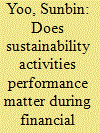| Srl | Item |
| 1 |
ID:
180151


|
|
|
|
|
| Summary/Abstract |
As a market for sustainability investing is growing rapidly, understanding the impact of environmental, social, and governance (ESG) activities on firms’ financial performance is becoming increasingly important. In this study, we examine the effect of ESG performance on stock returns and volatility during the financial crisis resulting from the coronavirus (COVID-19) pandemic. To quantify the impact, we use company-level daily ESG score data and United Nations Global Compact (GC) score data. In our dataset, ESG scores indicate ESG performance that is deemed important to financial materiality, and the GC score indicates the firm reputation for following UN rules. Our results indicate that during the pandemic, an increase in the ESG score, especially the E score component, is related to higher returns and lower volatility. Conversely, increasing GC scores is correlated with lower stock returns and higher volatility. In addition, we find that firms in lower return groups benefit more than other firms. Focusing on energy sector impacts, we show that although the non-energy sector benefits more than the energy sector from increasing E scores, energy sector firms can still reduce their stock price volatility by increasing these scores. Our study offers significant implications for ESG investment strategies during financial crises.
|
|
|
|
|
|
|
|
|
|
|
|
|
|
|
|
| 2 |
ID:
168681


|
|
|
|
|
| Summary/Abstract |
While the fuel economy of Japanese automobiles has improved by 40% in the past decade, gasoline consumption in the transportation sector from 2007 to 2016 only decreased by 4%. We seek to explain this discrepancy by investigating Japanese fuel economy standards and the financial incentives given to consumers of fuel-efficient cars. To do so, this study explores whether Japanese policies caused such a rebound effect, by employing the difference-in-difference framework. We find that these policies contribute to energy rebound effect, by enabling higher fuel consumption at lower costs and thus causing higher energy usages. We provide evidence that policies can increase not only fuel usage but also fuel costs. The main driving force behind the rebound effect is the increase in the sales of hybrid vehicles, induced by financial incentives.
|
|
|
|
|
|
|
|
|
|
|
|
|
|
|
|